Today, I came to join a hackathon called Hack for Peace in the Middle East.

Opening Talk
Quotes from the talk:
"Let's make peace through technology from bottom-up, if we can't make peace through politics." "Middle East needs more communication."
======================================================
Talks from entrepreneurs from Middle East
This was an opportunity for us to learn how business cultures and environments are different.
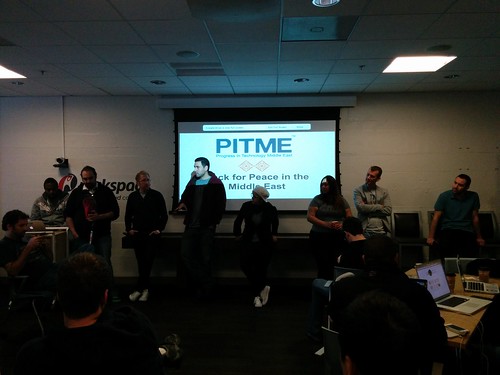
Presella.com from Lebanon
Users create an unconfirmed event (like concerts), set the target number of tickets they'd like to sell, and run the event only if the target is reached. The other ways is to presell regular confirmed events by offering perks and discounts on early bird tickets. They defined themselves as "KickStarter for ticket sales".
They also talked about how different the payment environment is- credit card is not norm, and when they started, more than 85% of payment was offline, but now only few people prefer to pay offline. However, people in Middle East still are not willing to use credit card online, so they need to adjust to that. They are thinking of using Bitcoin, and if that happens, they will be first company in Middle East to use Bitcoin ;) They have no competitor, because nobody else in Middle East is selling event tickets online. (Wow!)
Mena360.com from Dubai, UAE
They resell products and contents from non-Arabic countries to Arabic countries, defined themselves as a "gateway for e-commerce in Arab". There are lots of barriers for non-Arab companies to enter the market, including language translation, business custom difference, cultural difference, etc. FedEx's service is not sufficient to run logistics in Arab, financial culture is different, and it is too much work for customers to return products- so Mena360 is a service that resolves all those issues specific to Arab world.
Trochet from Saudi Arabia
Trochet is a word that mixed "trash" and "crochet", the project gathers recycled plastic bags and sends them to women in need to knit or crochet them to produce bean-bags etc. Trochet then sells the products and uses the money to support the women.

Disrupt CK from Tunisia
They defined themselves as "Shazam for TV"- and that they enable users to use e-commerce via TV screens.
Qordoba.com from Dubai, UAE
Qordoba is a translation service, using human translation and machine translation. They actually have 1,200 certified linguists to translate, in 25 languages. Their clients are government agencies and airlines, basically customers that have enough budget and wants high quality translation. They are also creating E-reader which is cheap and high quality- he said it is less than1mm.
Crowdsway from Cairo, Egypt
Crowdsway is a service that helps to connect filmmakers to small businesses that wants to get videos created, although they are going to pivot to a service to engage customers.
======================================================
Presentation by Stanford Peace Innovation Lab
There is a new concept "Peace for profit". The question is, how good can humans be to each other?
Human trends- urban, dense, coastal, networked. There will be 3-5 billion people living in cities. There will be censors, things will be ubiquitous, social & interpersonal. Measuring, modeling and predicting will be enabled by those data.
In the past, we only had human to human direct interactions, but now how people engage with others have changed. People can publish episodes of stories, and those episodes will be shared without human interactions.
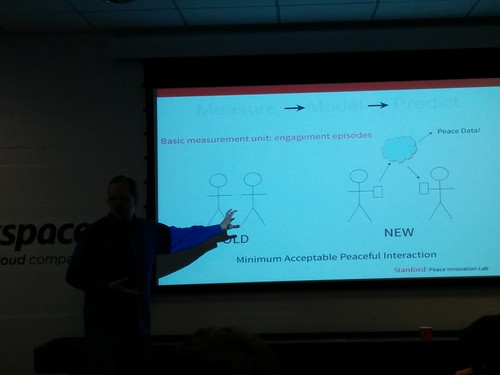
Peace building stack. How can humans be nicer to each other? Past efforts for peace was focused on how to reduce bad things to happen (like conflicts). How can we increase awareness, attention, communication, coordination, cooperation, collaboration and collective intelligence to lead to sustainable peace? There's no perfect solution for peace, but we can improve.
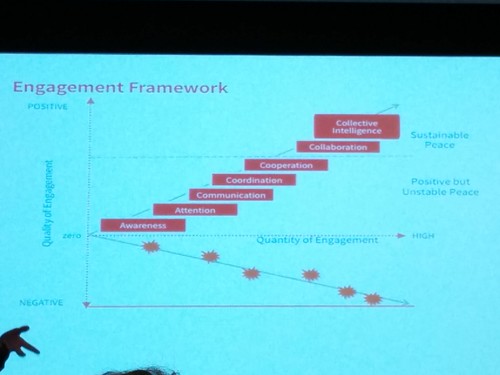
Design Principles for Peace Tech:
Share what doesn't work.
Start with TINY behaviors. Don't start shooting for making big changes when working for peace.
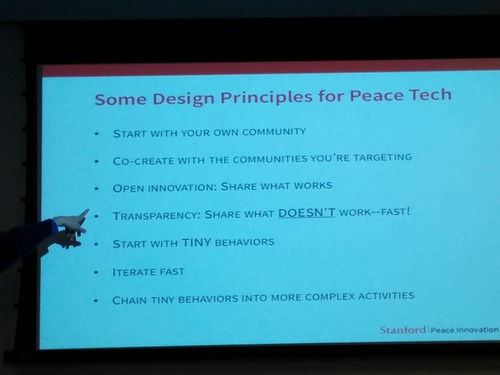
Peace Innovation Design Loop.
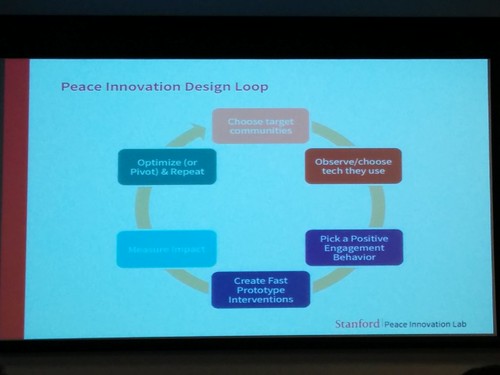
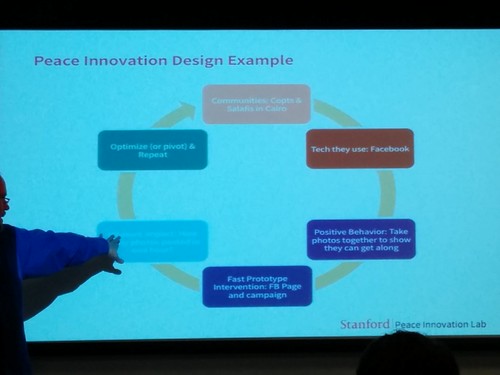
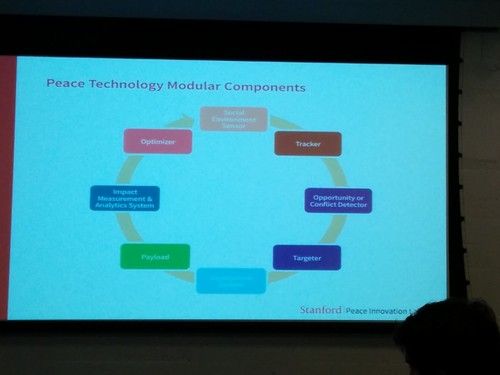
"The real threat is behavior, not the person."
Design behavior. Trigger behavior.
Staying in other people's house is scary, especially if you don't know who that person is. But if we think about AirBnB, it changed the game by data, information, and social aspect.
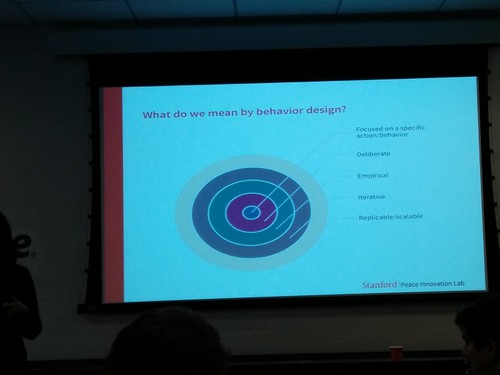
How do we drive people to do something? What is the trigger, motivation, ability to make someone do something?
- It needs to be simple and clear. Usually commitment to repeat is hard, so temporal aspect is important too.
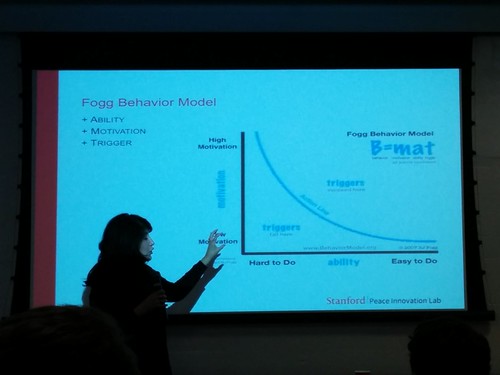
"Core loop"
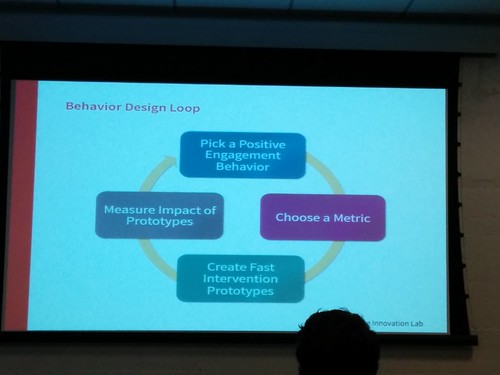
Understanding what is the sequence for your service.
ex) Angrybirds
Play the game, satisfaction, and repeat.
How do we have users repeat with more complicated service?
ex) Amazon
Search, purchase, pay.
Amazon provides things like recommendation and local deals to make you repeat.
"If you can't measure, you can't impact."
In the past, non-profits were bad at measuring- and the outcomes were merely you "feel good". Measuring is important.
Behavior design for health: Nike
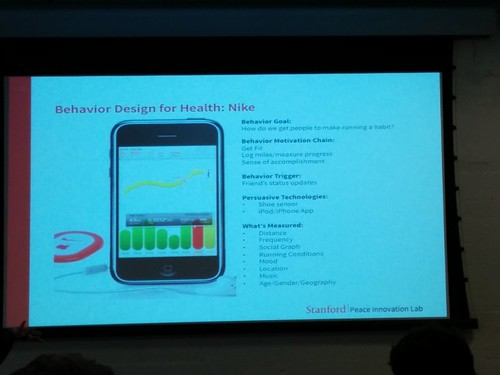
Behavior design for civility: Lyft Rideshare
Car-sharing existed before Lyft, but it was hard! You didn't know who the driver was, if he or she is a nice person, etc. With data, users are much more comfortable doing car sharing, and people's behavior changed, because it will all be visible by data. People try to do good actions, incentivized to be good.
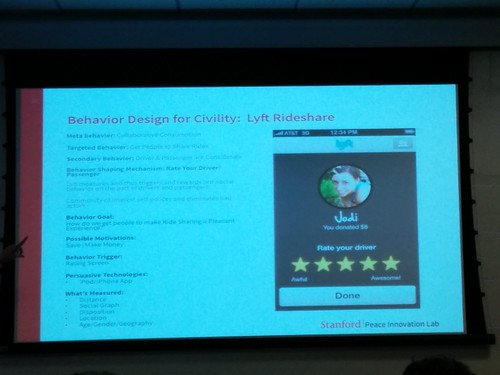
Behavior Design for Community Cohesion: NextDoor
NextDoor is a hyper local network. The speaker lives in Palo Alto, but since she needs to work during the day, she has not had opportunities to know her neighbors, and talk with her neighbors until she used NextDoor. She knows who has small children like her, what they like, and feels more comfortable talking with them when she sees them on the street. "NextDoor enable us to be sociable."
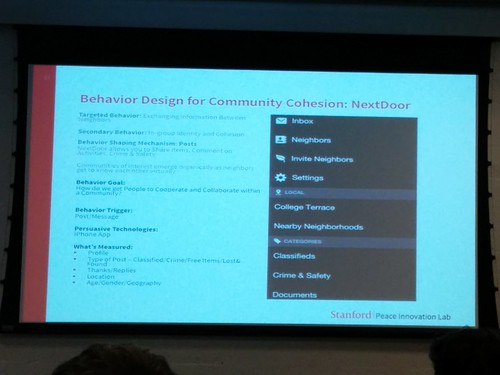
Lastly some comments:
Start by gaining empathy
Reframe the problem
Precisely define behavior
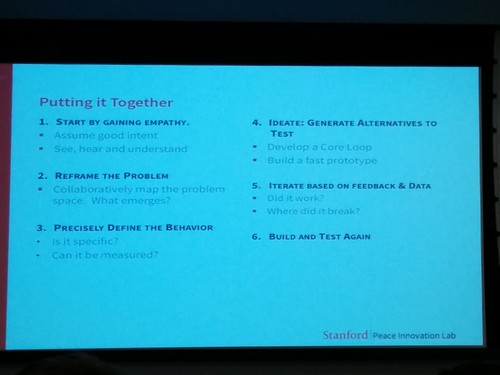
======================================================
Attendees idea pitch for the hackathon
Fisking
Building a fact-checking platform. This participant went to Iraq for military, which he regrets but he lacked information to make conscious decision. So, he started to build an online platform that can take news articles, and crowdsource commenting and fact-checking those articles to point out what is false information, what is biased article, what is propaganda, etc.
Platform to monetize videos
Online platform to tackle weight loss in group
An app to inform the police officer if the person is good or not
Power partners
A platform for users to share their skills, connect and create teams
A service for women to share and sell their food
In some countries in Middle East, women's work is to cook for the family. If we made a service for them to create extra few plates and sell, and contribute to the family income, it will empower women's status. Targeting tourists as well.
Solving the unemployment problem in Tunisia
Unemployment is a huge problem in Tunisia, especially after the revolution, Tunisia is seen as a country that is not safe, so tourists won't come, and 7,000 people lost their jobs.
Make a business model for Time banks
Disaster Information Platform
During disaster, people needs to localize information, find people, donate money, etc.
Foodies without borders
Create empathy through food photos. foodunites.us
Communication tool for disaster
Service to share knowledge and information for Peeks (Palestine geeks)
A service to combine Groupon and Meetup and make it better
Better function to meetup.com so that participants can communicate within the community. For example, if they went rockclimbing together, they can also get discounts and go to bar together after that.
Something like Coca-Cola "Small World Machines" campaign
This campaign brought people in Pakistan and India together. Also, it is notable that Coca-Cola was not using their philanthropy budget but ad budget, and making this campaign business sense.
Other things to think about- governments can shut down your service. In MiddleEast, we already saw that happen in the past. Force can't fix things!
Some more pictures from hackathon:
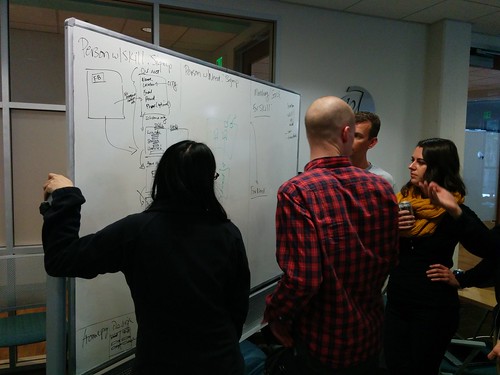
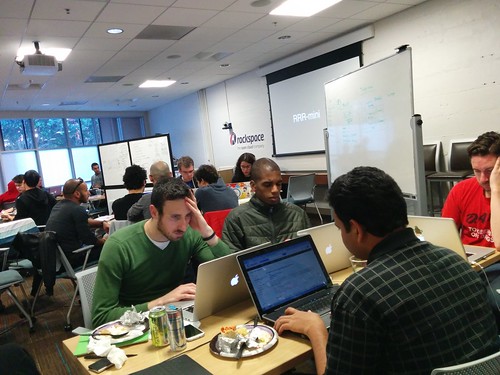
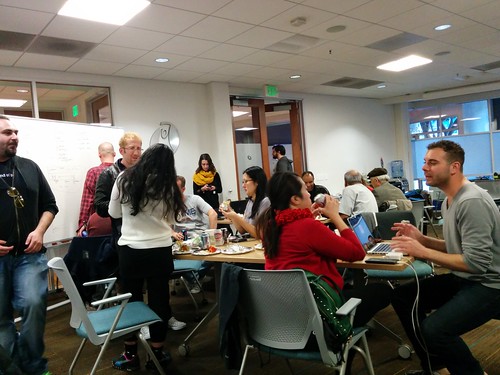
Disclaimer: The opinions expressed here are my own, and do not reflect those of my employer. -Fumi Yamazaki

Opening Talk
Quotes from the talk:
"Let's make peace through technology from bottom-up, if we can't make peace through politics." "Middle East needs more communication."
======================================================
Talks from entrepreneurs from Middle East
This was an opportunity for us to learn how business cultures and environments are different.

Presella.com from Lebanon
Users create an unconfirmed event (like concerts), set the target number of tickets they'd like to sell, and run the event only if the target is reached. The other ways is to presell regular confirmed events by offering perks and discounts on early bird tickets. They defined themselves as "KickStarter for ticket sales".
They also talked about how different the payment environment is- credit card is not norm, and when they started, more than 85% of payment was offline, but now only few people prefer to pay offline. However, people in Middle East still are not willing to use credit card online, so they need to adjust to that. They are thinking of using Bitcoin, and if that happens, they will be first company in Middle East to use Bitcoin ;) They have no competitor, because nobody else in Middle East is selling event tickets online. (Wow!)
Mena360.com from Dubai, UAE
They resell products and contents from non-Arabic countries to Arabic countries, defined themselves as a "gateway for e-commerce in Arab". There are lots of barriers for non-Arab companies to enter the market, including language translation, business custom difference, cultural difference, etc. FedEx's service is not sufficient to run logistics in Arab, financial culture is different, and it is too much work for customers to return products- so Mena360 is a service that resolves all those issues specific to Arab world.
Trochet from Saudi Arabia
Trochet is a word that mixed "trash" and "crochet", the project gathers recycled plastic bags and sends them to women in need to knit or crochet them to produce bean-bags etc. Trochet then sells the products and uses the money to support the women.

Disrupt CK from Tunisia
They defined themselves as "Shazam for TV"- and that they enable users to use e-commerce via TV screens.
Qordoba.com from Dubai, UAE
Qordoba is a translation service, using human translation and machine translation. They actually have 1,200 certified linguists to translate, in 25 languages. Their clients are government agencies and airlines, basically customers that have enough budget and wants high quality translation. They are also creating E-reader which is cheap and high quality- he said it is less than1mm.
Crowdsway from Cairo, Egypt
Crowdsway is a service that helps to connect filmmakers to small businesses that wants to get videos created, although they are going to pivot to a service to engage customers.
======================================================
Presentation by Stanford Peace Innovation Lab
There is a new concept "Peace for profit". The question is, how good can humans be to each other?
Human trends- urban, dense, coastal, networked. There will be 3-5 billion people living in cities. There will be censors, things will be ubiquitous, social & interpersonal. Measuring, modeling and predicting will be enabled by those data.
In the past, we only had human to human direct interactions, but now how people engage with others have changed. People can publish episodes of stories, and those episodes will be shared without human interactions.

Peace building stack. How can humans be nicer to each other? Past efforts for peace was focused on how to reduce bad things to happen (like conflicts). How can we increase awareness, attention, communication, coordination, cooperation, collaboration and collective intelligence to lead to sustainable peace? There's no perfect solution for peace, but we can improve.

Design Principles for Peace Tech:
Share what doesn't work.
Start with TINY behaviors. Don't start shooting for making big changes when working for peace.

Peace Innovation Design Loop.



Design behavior. Trigger behavior.
Staying in other people's house is scary, especially if you don't know who that person is. But if we think about AirBnB, it changed the game by data, information, and social aspect.
More talk about Behavior Design.

How do we drive people to do something? What is the trigger, motivation, ability to make someone do something?
- It needs to be simple and clear. Usually commitment to repeat is hard, so temporal aspect is important too.

"Core loop"

ex) Angrybirds
Play the game, satisfaction, and repeat.
How do we have users repeat with more complicated service?
ex) Amazon
Search, purchase, pay.
Amazon provides things like recommendation and local deals to make you repeat.
"If you can't measure, you can't impact."
In the past, non-profits were bad at measuring- and the outcomes were merely you "feel good". Measuring is important.
Behavior design for health: Nike

Behavior design for civility: Lyft Rideshare
Car-sharing existed before Lyft, but it was hard! You didn't know who the driver was, if he or she is a nice person, etc. With data, users are much more comfortable doing car sharing, and people's behavior changed, because it will all be visible by data. People try to do good actions, incentivized to be good.

Behavior Design for Community Cohesion: NextDoor
NextDoor is a hyper local network. The speaker lives in Palo Alto, but since she needs to work during the day, she has not had opportunities to know her neighbors, and talk with her neighbors until she used NextDoor. She knows who has small children like her, what they like, and feels more comfortable talking with them when she sees them on the street. "NextDoor enable us to be sociable."

Lastly some comments:
Start by gaining empathy
Reframe the problem
Precisely define behavior
Ideate: generate alternatives to test
Iterate based on feedback and data
Build and test again

======================================================
Attendees idea pitch for the hackathon
Fisking
Building a fact-checking platform. This participant went to Iraq for military, which he regrets but he lacked information to make conscious decision. So, he started to build an online platform that can take news articles, and crowdsource commenting and fact-checking those articles to point out what is false information, what is biased article, what is propaganda, etc.
Platform to monetize videos
Online platform to tackle weight loss in group
An app to inform the police officer if the person is good or not
Power partners
A platform for users to share their skills, connect and create teams
A service for women to share and sell their food
In some countries in Middle East, women's work is to cook for the family. If we made a service for them to create extra few plates and sell, and contribute to the family income, it will empower women's status. Targeting tourists as well.
Solving the unemployment problem in Tunisia
Unemployment is a huge problem in Tunisia, especially after the revolution, Tunisia is seen as a country that is not safe, so tourists won't come, and 7,000 people lost their jobs.
Make a business model for Time banks
Disaster Information Platform
During disaster, people needs to localize information, find people, donate money, etc.
Foodies without borders
Create empathy through food photos. foodunites.us
Communication tool for disaster
Service to share knowledge and information for Peeks (Palestine geeks)
A service to combine Groupon and Meetup and make it better
Better function to meetup.com so that participants can communicate within the community. For example, if they went rockclimbing together, they can also get discounts and go to bar together after that.
Something like Coca-Cola "Small World Machines" campaign
This campaign brought people in Pakistan and India together. Also, it is notable that Coca-Cola was not using their philanthropy budget but ad budget, and making this campaign business sense.
Other things to think about- governments can shut down your service. In MiddleEast, we already saw that happen in the past. Force can't fix things!
Some more pictures from hackathon:



Disclaimer: The opinions expressed here are my own, and do not reflect those of my employer. -Fumi Yamazaki
0 件のコメント:
コメントを投稿